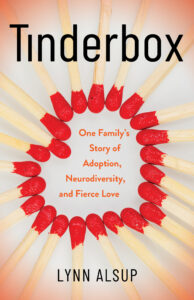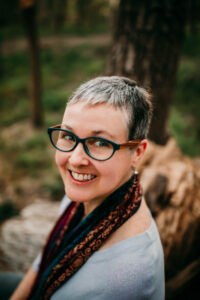Tinderbox: One Family’s Story of Adoption, Neurodiversity, and Fierce Love by Lynn Alsup – Book Excerpt

Because I knew the gifts and struggles of parenting kids with brain- based differences and a path to more peace and joy, I said yes to the persistent nudge to offer a support group. My social worker-self wanted a central, private location and university occupational therapy students running a concurrent kids’ group so parents could come. But that overwhelmed me. Instead, I posted a date for Rosa’s Café on all my FASD Facebook groups and invited everyone in West Texas. I arrived early and ordered chips, salsa, and guacamole. My whole plan; my true yes. It was enough to launch Living Well support group: a monthly hour of guided conversation followed by an hour of neuro- behavioral training. My next yes delivered me to Portland’s fall foliage and drizzle—making me homesick for Vancouver—immersed in like-minded community and the FASCETS Neurobehavioral Model for the first week-long intensive of FASCETS’s Training of Facilitators.
I returned home inspired and energized, and Clare told me she’d added a holiday sales job to her YMCA work to make more money. Then she failed all her classes. She quit the YMCA over winter break, then realized her sales job ended after the holidays. She asked for help. I knew she needed a consistent school and work schedule to give her structure and a lighter school load. No race to graduate. We met with her adviser and chose two classes at the same time on alternate days, and she hunted for a new job.
As my understanding of neurodiversity deepened, I realized the Neurobehavioral Model spoke to all of life. Jeff ’s and my differences were brain-based, too. I rustled up training gigs and connections where I knew people with FASD ended up: adoption and foster care agencies, speech and occupational therapy offices, counseling centers, at-risk student programs, and mental health collaboratives. Kept Julie, my mentor at FASCETS, on speed dial for consults. I reserved tables at the Autism Walk resource fair and the Kids Mental Health Day at the library, handing out Trying Differently Rather Than Harder. And created my first business cards in almost twenty years. All the while, guiding meditation, praying, and trying to show up differently for my kids.
I sidled up to Lucy washing dishes at the kitchen sink one Saturday. Her frown made me check my mental calendar—an imprint of the Flo app that tracked her periods. Man, I wished I’d had one for Clare. No ovulation or menstruation happening, two things that wreaked havoc with her emotions and energy every couple of weeks.
“You look like a Klingon from Star Trek, your forehead is so wrinkled, Lu. Why are you scowling?” Instead of replying, she deepened the furrows. I should have clued in: she couldn’t talk or reason right then. But I started a familiar conversation. “You can’t hold the washcloth with two fingers and swipe at the dishes, Lu. You have to scrub.”
“Eww.” She looked like she wanted to vomit. “I am washing them,” she groused. She didn’t know why I used a dirty, nasty dish cloth to wash dishes. It was disgusting.
My defenses raised, I offered her a few minutes to get respectful and calm down. Then we could talk about it. I turned from the sink and focused on my breath as I picked up the quinoa. The tiny grains tumbled into the sieve-like yellow sand. Water created valleys and built bumpy hills where it hit as I rinsed them. Breath and attention connected me to my superpower—curiosity. I turned off the faucet.
“Lucy, do you know what I mean when I say, ‘get respectful’?” She shook her head.
“Do you know what a respectful voice and face are like?” Again, no.
Right, I have to teach her this abstract thing. When we both calm down.
I dumped the quinoa in a stainless steel pot and added four cups of water as she piled the cleanish dishes on the drying rack. I noticed she did put everything upside-down to dry. Something to celebrate. That had taken a year of reminders. Repeat. Repeat. Repeat. She walked away as the click, click, click of the igniter lit the gas fire under my quinoa. I lifted the window above my kitchen window- sill collection of rocks, shells, and a succulent, and in floated a cool spring breeze. It spread the nutty aroma wafting from the stove. When I blended chickpeas with garlic, lemon, and olive oil, the fusion of smells grounded me. I walked into the living room.
“Lucy, I want to talk about respectful now.”
“Uh-uh.” She stood up and walked toward her bedroom.
“Lucia, don’t,” I warned. “I told you we’d talk about this. I gave you time.” She had rounded the corner. Relieved when she walked back, I hoped it wouldn’t be an all-out battle. That we both could stay in our wise minds long enough to talk about it.
I asked her to show me what a respectful face looked like. She tried, but the muscles in her face just contorted. I dropped down to basics: happy. She held her blankie up for a sniff to comfort and regulate herself. I waited. Then she smiled. Sad: frown. Mad: scowl. Mean: snarl that turned into a chuckle and grew into her signature giggle. I laughed, too. I scooted closer—game mode instead of fight mode.
I described how our dogs only understood tone of voice, not words. When I asked if she knew what I meant, she said yes, but they knew their names, too. I conceded that to her literal truth telling. Then hammed “stop” in a sweet and then a stern voice. To which one did the dogs respond? She got it.
“Say, ‘Mom, I like you’ in a nice voice.” “Mom, I like you,” she said syrupy-sweet. “Perfect. Now say it mean.”
She did just like the kids on the Disney Channel she still loved to watch. Her eyes twinkled from behind her blankie.
“You can always say what you think and feel, Lu. It just matters how you say it. Am I making sense?” I checked in again. “Yeah.”
As an afterthought, I asked, “By the way, why do you hate washing dishes?”
She didn’t even have to think. “You know how I hate walking through the wet bathroom at the swimming pool? Yucky water and squashy toilet paper on the ground?” She grimaced and I nodded.
“It’s like that. Putting my hands in dirty water and touching the squishy wash rag with germs all over it.” She looked a bit green.
“Hmm. So if you used running water and a clean dish rag, you wouldn’t mind?” Could I really let her waste water like that? Definitely a values clash.
“I’d still hate washing dishes, but it wouldn’t be disgusting.”
“That’s fair. I hate washing dishes, too. But we can make it better for you.”
She looked past me out the window at the familiar woman passing our house with her five dogs. I’d stretched the ten minutes Lucy could focus. And that was if she wasn’t hungry, tired, thirty, or upset.
When I thanked her for talking, she jumped up to grab her phone and check her texts. We’d made it to the other side of one of the many confusing conflicts each day held.
 Author bio:
Author bio:
Lynn Alsup is a social worker, spiritual director, and meditation teacher. Her three extraordinary, neurodivergent daughters led her to FASCETS, where she now trains parents and professionals in the Neurobehavioral Model; a paradigm that fosters celebration and accommodation of neurodiversity. She lives with her family on the edge of the Chihuahuan desert in Midland, TX, building resilience and joy through writing, yoga, wide-open spaces, and snuggling her four-legged rescuer, Bryn the Bassador. Visit https://www.lynnalsup.com















